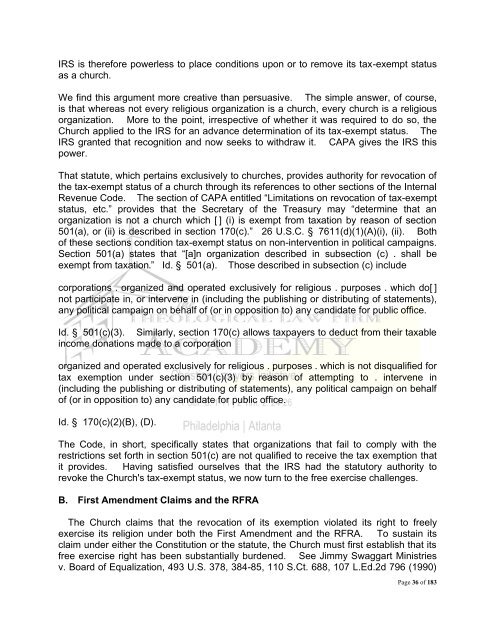The 508(c)(1)(a) Initiative Workshop
The 508(c)(1)(a) Initiative Workshop
The 508(c)(1)(a) Initiative Workshop
Create successful ePaper yourself
Turn your PDF publications into a flip-book with our unique Google optimized e-Paper software.
IRS is therefore powerless to place conditions upon or to remove its tax-exempt status<br />
as a church.<br />
We find this argument more creative than persuasive. <strong>The</strong> simple answer, of course,<br />
is that whereas not every religious organization is a church, every church is a religious<br />
organization. More to the point, irrespective of whether it was required to do so, the<br />
Church applied to the IRS for an advance determination of its tax-exempt status. <strong>The</strong><br />
IRS granted that recognition and now seeks to withdraw it. CAPA gives the IRS this<br />
power.<br />
That statute, which pertains exclusively to churches, provides authority for revocation of<br />
the tax-exempt status of a church through its references to other sections of the Internal<br />
Revenue Code. <strong>The</strong> section of CAPA entitled “Limitations on revocation of tax-exempt<br />
status, etc.” provides that the Secretary of the Treasury may “determine that an<br />
organization is not a church which [ ] (i) is exempt from taxation by reason of section<br />
501(a), or (ii) is described in section 170(c).” 26 U.S.C. § 7611(d)(1)(A)(i), (ii). Both<br />
of these sections condition tax-exempt status on non-intervention in political campaigns.<br />
Section 501(a) states that “[a]n organization described in subsection (c) ․ shall be<br />
exempt from taxation․” Id. § 501(a). Those described in subsection (c) include<br />
corporations ․ organized and operated exclusively for religious ․ purposes ․ which do[ ]<br />
not participate in, or intervene in (including the publishing or distributing of statements),<br />
any political campaign on behalf of (or in opposition to) any candidate for public office.<br />
Id. § 501(c)(3). Similarly, section 170(c) allows taxpayers to deduct from their taxable<br />
income donations made to a corporation<br />
organized and operated exclusively for religious ․ purposes ․ which is not disqualified for<br />
tax exemption under section 501(c)(3) by reason of attempting to ․ intervene in<br />
(including the publishing or distributing of statements), any political campaign on behalf<br />
of (or in opposition to) any candidate for public office.<br />
Id. § 170(c)(2)(B), (D).<br />
<strong>The</strong> Code, in short, specifically states that organizations that fail to comply with the<br />
restrictions set forth in section 501(c) are not qualified to receive the tax exemption that<br />
it provides. Having satisfied ourselves that the IRS had the statutory authority to<br />
revoke the Church's tax-exempt status, we now turn to the free exercise challenges.<br />
B. First Amendment Claims and the RFRA<br />
<strong>The</strong> Church claims that the revocation of its exemption violated its right to freely<br />
exercise its religion under both the First Amendment and the RFRA. To sustain its<br />
claim under either the Constitution or the statute, the Church must first establish that its<br />
free exercise right has been substantially burdened. See Jimmy Swaggart Ministries<br />
v. Board of Equalization, 493 U.S. 378, 384-85, 110 S.Ct. 688, 107 L.Ed.2d 796 (1990)<br />
Page 36 of 183
















